Students' Perceptions of Using Portfolio in the Specialized Translation Classroom
DOI:
https://doi.org/10.7203/qf.24.16304Keywords:
specialized translation, formative assessment, translation competence, portfolio, undergraduate students Abstract
Abstract
The implementation of the new degrees in Translation and Interpretation, following the guidelines established in the European Higher Education Area, has brought with it many adjustments, modifications and adaptations in the methodology of the teaching-learning process within the university arena. In this sense, and more specifically in the field of the evaluation of teaching-learning of specialized translation, the use of useful, as well as reliable tools for collecting information, for a better and exhaustive assessment of learning among students, is more than necessary. In this work, we highlight, through the administration of a questionnaire to third-year undergraduate students of Specialized Translation of the University of Granada, the students’ perception of their own learning, based on the sub-competences acquired during the preparation of a portfolio.
 Downloads
Downloads
Downloads
Published
How to Cite
-
Abstract481
-
PDF (Español)428
Issue
Section
License
 Este obra está bajo una licencia de Creative Commons Reconocimiento-NoComercial-SinObraDerivada 4.0 Internacional.
Este obra está bajo una licencia de Creative Commons Reconocimiento-NoComercial-SinObraDerivada 4.0 Internacional.
Authors who publish with this journal agree to the following terms:
- Authors retain copyright and grant the journal right of first publication with the work simultaneously licensed under a Creative Commons Attribution License that allows others to share the work with an acknowledgement of the work's authorship and initial publication in this journal.
- Authors are able to enter into separate, additional contractual arrangements for the non-exclusive distribution of the journal's published version of the work (e.g., post it to an institutional repository or publish it in a book), with an acknowledgement of its initial publication in this journal.
- Authors are permitted and encouraged to post their work online (e.g., in institutional repositories or on their website) prior to and during the submission process, as it can lead to productive exchanges, as well as earlier and greater citation of published work (See The Effect of Open Access).



